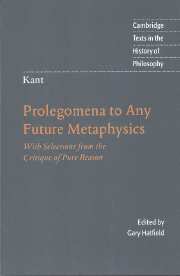Book contents
- Frontmatter
- Contents
- Acknowledgments
- Introduction
- Chronology
- Further reading
- Note on texts and translation
- Prolegomena to Any Future Metaphysics
- Selections from the Critique of Pure Reason
- Table of Contents for the Critique
- From the Preface to the Second Edition
- From the Introduction
- From the Transcendental Aesthetic
- From the Transcendental Logic, Introduction
- From the Transcendental Logic, First Division, Analytic
- From the Transcendental Logic, Second Division, Dialectic
- From the Transcendental Doctrine of Method
- Index
- Cambridge texts in the history of philosophy
From the Introduction
Published online by Cambridge University Press: 05 June 2012
- Frontmatter
- Contents
- Acknowledgments
- Introduction
- Chronology
- Further reading
- Note on texts and translation
- Prolegomena to Any Future Metaphysics
- Selections from the Critique of Pure Reason
- Table of Contents for the Critique
- From the Preface to the Second Edition
- From the Introduction
- From the Transcendental Aesthetic
- From the Transcendental Logic, Introduction
- From the Transcendental Logic, First Division, Analytic
- From the Transcendental Logic, Second Division, Dialectic
- From the Transcendental Doctrine of Method
- Index
- Cambridge texts in the history of philosophy
Summary
From all of this now follows the idea of a special science, which can be called the critique of pure reason. For reason is the faculty that supplies the principles of a priori cognition. Hence, pure reason is what contains the principles for unconditionally cognizing something a priori. An organon of pure reason would be a collection of those principles according to which all pure cognition a priori can be acquired and actually brought about. The complete execution of such an organon would yield a system of pure reason. But since this system is greatly desired, and since it is still undecided whether, and in what instances, an expansion of our cognition is in general possible here, we can look upon a science of the mere appraisal of pure reason, its sources and boundaries, as the propaedeutic to the system of pure reason. Such a science should not be called a doctrine, but only a critique of pure reason, and its benefit, with respect to speculation, would actually be only negative, serving not for the expansion but only for the purification of our reason, and for keeping reason free of error, which is already a very great gain. I call all cognition transcendental that is in general concerned not so much with objects as with the mode of our cognition of objects, insofar as this cognition is supposed to be possible a priori.
- Type
- Chapter
- Information
- Kant: Prolegomena to Any Future MetaphysicsWith Selections from the Critique of Pure Reason, pp. 159 - 160Publisher: Cambridge University PressPrint publication year: 1997



